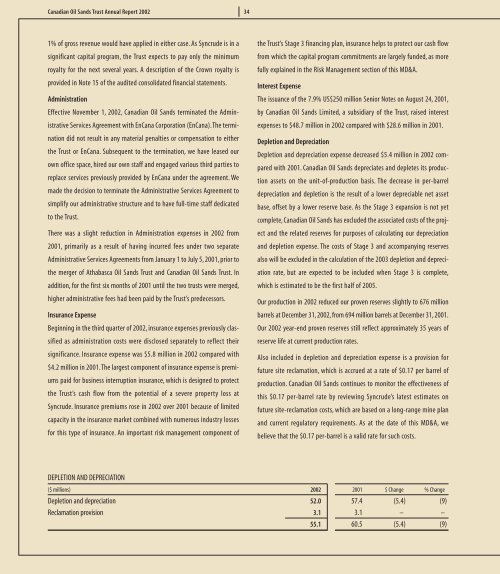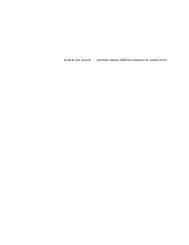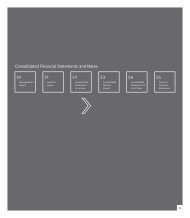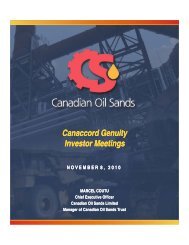Full Annual Report (PDF 1.39 MB) - Canadian Oil Sands
Full Annual Report (PDF 1.39 MB) - Canadian Oil Sands
Full Annual Report (PDF 1.39 MB) - Canadian Oil Sands
Create successful ePaper yourself
Turn your PDF publications into a flip-book with our unique Google optimized e-Paper software.
<strong>Canadian</strong> <strong>Oil</strong> <strong>Sands</strong> Trust <strong>Annual</strong> <strong>Report</strong> 2002 34<br />
1% of gross revenue would have applied in either case. As Syncrude is in a<br />
significant capital program, the Trust expects to pay only the minimum<br />
royalty for the next several years. A description of the Crown royalty is<br />
provided in Note 15 of the audited consolidated financial statements.<br />
Administration<br />
Effective November 1, 2002, <strong>Canadian</strong> <strong>Oil</strong> <strong>Sands</strong> terminated the Administrative<br />
Services Agreement with EnCana Corporation (EnCana).The termination<br />
did not result in any material penalties or compensation to either<br />
the Trust or EnCana. Subsequent to the termination, we have leased our<br />
own office space, hired our own staff and engaged various third parties to<br />
replace services previously provided by EnCana under the agreement. We<br />
made the decision to terminate the Administrative Services Agreement to<br />
simplify our administrative structure and to have full-time staff dedicated<br />
to the Trust.<br />
There was a slight reduction in Administration expenses in 2002 from<br />
2001, primarily as a result of having incurred fees under two separate<br />
Administrative Services Agreements from January 1 to July 5, 2001, prior to<br />
the merger of Athabasca <strong>Oil</strong> <strong>Sands</strong> Trust and <strong>Canadian</strong> <strong>Oil</strong> <strong>Sands</strong> Trust. In<br />
addition, for the first six months of 2001 until the two trusts were merged,<br />
higher administrative fees had been paid by the Trust’s predecessors.<br />
Insurance Expense<br />
Beginning in the third quarter of 2002, insurance expenses previously classified<br />
as administration costs were disclosed separately to reflect their<br />
significance. Insurance expense was $5.8 million in 2002 compared with<br />
$4.2 million in 2001.The largest component of insurance expense is premiums<br />
paid for business interruption insurance, which is designed to protect<br />
the Trust’s cash flow from the potential of a severe property loss at<br />
Syncrude. Insurance premiums rose in 2002 over 2001 because of limited<br />
capacity in the insurance market combined with numerous industry losses<br />
for this type of insurance. An important risk management component of<br />
the Trust’s Stage 3 financing plan, insurance helps to protect our cash flow<br />
from which the capital program commitments are largely funded, as more<br />
fully explained in the Risk Management section of this MD&A.<br />
Interest Expense<br />
The issuance of the 7.9% US$250 million Senior Notes on August 24, 2001,<br />
by <strong>Canadian</strong> <strong>Oil</strong> <strong>Sands</strong> Limited, a subsidiary of the Trust, raised interest<br />
expenses to $48.7 million in 2002 compared with $28.6 million in 2001.<br />
Depletion and Depreciation<br />
Depletion and depreciation expense decreased $5.4 million in 2002 compared<br />
with 2001. <strong>Canadian</strong> <strong>Oil</strong> <strong>Sands</strong> depreciates and depletes its production<br />
assets on the unit-of-production basis. The decrease in per-barrel<br />
depreciation and depletion is the result of a lower depreciable net asset<br />
base, offset by a lower reserve base. As the Stage 3 expansion is not yet<br />
complete, <strong>Canadian</strong> <strong>Oil</strong> <strong>Sands</strong> has excluded the associated costs of the project<br />
and the related reserves for purposes of calculating our depreciation<br />
and depletion expense. The costs of Stage 3 and accompanying reserves<br />
also will be excluded in the calculation of the 2003 depletion and depreciation<br />
rate, but are expected to be included when Stage 3 is complete,<br />
which is estimated to be the first half of 2005.<br />
Our production in 2002 reduced our proven reserves slightly to 676 million<br />
barrels at December 31, 2002, from 694 million barrels at December 31, 2001.<br />
Our 2002 year-end proven reserves still reflect approximately 35 years of<br />
reserve life at current production rates.<br />
Also included in depletion and depreciation expense is a provision for<br />
future site reclamation, which is accrued at a rate of $0.17 per barrel of<br />
production. <strong>Canadian</strong> <strong>Oil</strong> <strong>Sands</strong> continues to monitor the effectiveness of<br />
this $0.17 per-barrel rate by reviewing Syncrude’s latest estimates on<br />
future site-reclamation costs, which are based on a long-range mine plan<br />
and current regulatory requirements. As at the date of this MD&A, we<br />
believe that the $0.17 per-barrel is a valid rate for such costs.<br />
DEPLETION AND DEPRECIATION<br />
($ millions) 2002 2001 $ Change % Change<br />
Depletion and depreciation 52.0 57.4 (5.4) (9)<br />
Reclamation provision 3.1 3.1 – –<br />
55.1 60.5 (5.4) (9)





